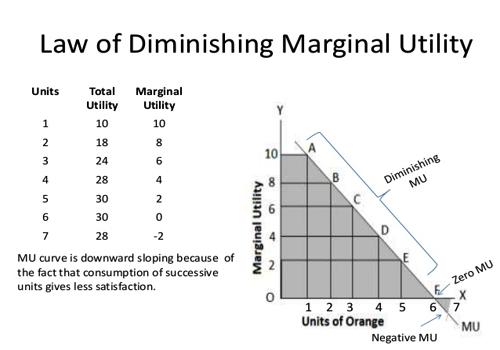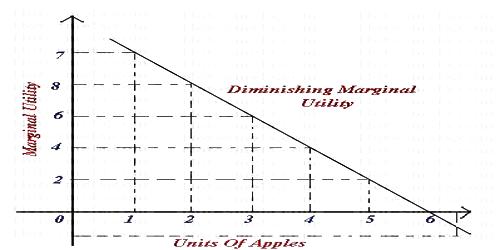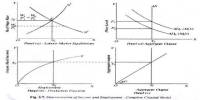Assumptions, Exceptions and Importance of the Law of Diminishing Marginal Utility
This law was first developed by a German economist Hermann Heinrich Gossen. This law is also known as the first law of Gosse. The law of diminishing marginal utility states that the marginal utility derived from the consumption of every additional unit goes on diminishing, other thing remaining the same. Therefore, the first unit of consumption for any product is typically highest, with every unit of consumption to follow holding less and less utility. Consumers handle the law of diminishing marginal utility by consuming numerous quantities of numerous goods.
Assumptions of the Law of Diminishing Marginal Utility
- Consumer should be rational.
- Consumer’s mental outlook should not change.
- Unit of good should not be very few or small. In such a case, the utility may not be measured accurately.
- Utility can be measured in the cardinal number.
- Marginal utility of money remains constant.
- All the units of consumption are homogeneous.
- There is continuous consumption of the commodity i.e, there is no time gap between the successive units of consumption.
- The units of consumptions are suitable in size.
- There is no change in tastes, nature, fashion and habits of the consumer.

Exceptions of Law of Diminishing Marginal Utility:
There are some exceptions or limitations to the law of diminishing utility.
(i) Case of intoxicants: Consumption of liquor defies the low for a short period. The more a person drinks, the more likes it. However, this is truer only initially. A stage comes when a drunkard too starts taking less and less liquor and eventually stops it.
(ii) Rare collection: If there are only two diamonds in the world, the possession of 2nd diamond will push up the marginal utility.
(iii) Application to money: The law equally holds good for money. It is true that more money the man has, the greedier he is to get additional units of it. However, the truth is that the marginal utility of money declines with richness but never falls to zero.
Summing up, we can say that the law of diminishing utility, like other laws of Economics, is simply a statement of tendency. It holds good provided other factors remain constant.
Practical Importance of Law of Diminishing Marginal Utility:
The law of diminishing utility has great practical importance in economics. The law of demand, the theory of consumer’s surplus, and the equilibrium in the distribution of expenditure are derived from the law of diminishing marginal utility.
(i) Basis of the law of demand: The law of marginal diminishing utility and the law of demand are very closely related to each other. In fact they law of diminishing marginal utility, the more we have of a thing, and the less we want additional increment of it. In other words, we can say that as a person gets more and more of a particular commodity, the marginal utility of the successive units begins to diminish. So every consumer while buying a particular commodity compares the marginal utility of the commodity and the price of the commodity which he has to pay.
If the marginal utility of the commodity is higher than that of price, he purchases that commodity. As he buys more and more, the marginal utility of the successive units begins to diminish. Then he pays fewer amounts for the successive units. He tries to equate at every step the marginal utility and the price of the commodity, he must lower its price so that the consumers are induced to buy large quantities and this is what is explained in the law of demand. From this, we conclude that the law of demand and the law of diminishing are very closely inter-related.
(ii) Consumer’s surplus concept: The theory of consumer’s surplus is also based on the law of diminishing marginal utility. A consumer while purchasing the commodity compares the utility of the commodity with that of the price which he has to pay. In most of the cases, he is willing to pay more than what he actually pays. The excess of the price which he would be willing to pay rather than to go without the thing over that which he actually does pay is the economic measure of this surplus satisfaction. It is in fact difference between the total utility and the actually money spent.
(iii) Importance to the consumer: A consumer in order to get the maximum satisfaction from his relatively scare resources distributes his income on commodities and services in such a way that the marginal utility from all the uses are the same. Here again the concept of marginal utility helps the consumer in arranging his scale of preference for the commodities and services.
Limitations:
The limitations or exceptions of the law of diminishing marginal utility are as follows:
- The law does not hold well in the rare collections. For example, collection of ancient coins, stamps etc.
- The law is not fully applicable to money. The marginal utility of money declines with richness but never falls to zero.
- It does not apply to the knowledge, art and innovations.
- The law is not applicable for precious goods.
- Historical things are also included in exceptions to the law.
- Law does not operate if consumer behaves in irrational manner. For example, drunkard is said to enjoy each successive peg more than the previous one.
- Man is fond of beauty and decoration. He gets more satisfaction by getting the above merits of the commodities.
- If a dress comes in fashion, its utility goes up. On the other hand its utility goes down if it goes out of fashion.
- The utility increases due to demonstration. It is a natural element.
Information Source:
















